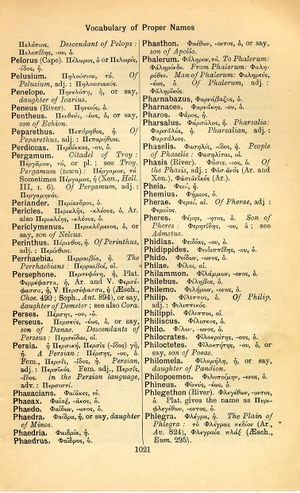Phineus: Difference between revisions
Θησαυρός ἐστι τοῦ βίου τὰ πράγματα → Non est thesaurus vitae nisi negotia → Des Lebensgutes Schatz erwächst aus Tätigkeit
(6_12) |
(D_7) |
||
| Line 4: | Line 4: | ||
{{Lewis | {{Lewis | ||
|lshtext=<b>Phīneus</b>: ĕi and ĕos (Gr.<br /><b>I</b> acc. plur. Phineas, Mart. 9, 26, 10), m., = Φινεύς.<br /><b>I</b> King of Salmydessus, in [[Thrace]]. He [[possessed]] the [[gift]] of [[prophecy]], [[but]] [[was]] struck [[with]] [[blindness]] for having deprived his [[sons]] of [[sight]], [[upon]] a false [[accusation]] made [[against]] [[them]] by Idœa, [[their]] [[step]]-[[mother]], Ov. M. 7, 3; Val. Fl. 4, 425; Hyg. Fab. 19; Serv. Verg. A. 3, 209; Ov. A. A. 1, 339; id. R. Am. 355.—<br /> <b>2</b> Transf., a [[blind]] [[man]], Mart. 9, 26, 10.—Hence,<br /> <b>B</b> Phīnēï-us and Phīnēus, a, um, adj., of or belonging to [[Phineus]], Phinean: Phineïa [[domus]], Verg. A. 3, 212: [[guttur]], Ov. F. 6, 131: Phineum [[venenum]], Petr. 136: aves, the [[Harpies]], Sen. Thyest. 154.—<br /> <b>2</b> Phīnī-des, ae, m., a [[male]] [[descendant]] of [[Phineus]], Ov. Ib. 273.—<br /><b>II</b> Brother of [[Cepheus]], [[who]] fought [[with]] [[Perseus]] [[about]] [[Andromeda]], and [[was]] changed by him [[into]] a [[stone]], Ov. M. 5, 8. | |lshtext=<b>Phīneus</b>: ĕi and ĕos (Gr.<br /><b>I</b> acc. plur. Phineas, Mart. 9, 26, 10), m., = Φινεύς.<br /><b>I</b> King of Salmydessus, in [[Thrace]]. He [[possessed]] the [[gift]] of [[prophecy]], [[but]] [[was]] struck [[with]] [[blindness]] for having deprived his [[sons]] of [[sight]], [[upon]] a false [[accusation]] made [[against]] [[them]] by Idœa, [[their]] [[step]]-[[mother]], Ov. M. 7, 3; Val. Fl. 4, 425; Hyg. Fab. 19; Serv. Verg. A. 3, 209; Ov. A. A. 1, 339; id. R. Am. 355.—<br /> <b>2</b> Transf., a [[blind]] [[man]], Mart. 9, 26, 10.—Hence,<br /> <b>B</b> Phīnēï-us and Phīnēus, a, um, adj., of or belonging to [[Phineus]], Phinean: Phineïa [[domus]], Verg. A. 3, 212: [[guttur]], Ov. F. 6, 131: Phineum [[venenum]], Petr. 136: aves, the [[Harpies]], Sen. Thyest. 154.—<br /> <b>2</b> Phīnī-des, ae, m., a [[male]] [[descendant]] of [[Phineus]], Ov. Ib. 273.—<br /><b>II</b> Brother of [[Cepheus]], [[who]] fought [[with]] [[Perseus]] [[about]] [[Andromeda]], and [[was]] changed by him [[into]] a [[stone]], Ov. M. 5, 8. | ||
}} | |||
{{Gaffiot | |||
|gf=<b>Phīneūs</b>,¹³ ĕī ou ĕos, m. (Φινεύς), Phinée<br /><b>1</b> roi d’Arcadie ou de Thrace, que les dieux rendirent aveugle : Ov. M. 7, 3 || par ext. au pl.] des aveugles : Mart. 9, 25, 10<br /><b>2</b> frère de Céphée, qui fut pétrifié par Persée : Ov. M. 5, 8 || <b>-nēĭus</b> et <b>-nēus</b> a, um, de Phinée : Virg. En. 3, 212 ; Ov. M. 5, 109. | |||
}} | }} | ||
Revision as of 07:00, 14 August 2017
English > Greek (Woodhouse)
Φινεύς, -έως, ὁ.
Latin > English (Lewis & Short)
Phīneus: ĕi and ĕos (Gr.
I acc. plur. Phineas, Mart. 9, 26, 10), m., = Φινεύς.
I King of Salmydessus, in Thrace. He possessed the gift of prophecy, but was struck with blindness for having deprived his sons of sight, upon a false accusation made against them by Idœa, their step-mother, Ov. M. 7, 3; Val. Fl. 4, 425; Hyg. Fab. 19; Serv. Verg. A. 3, 209; Ov. A. A. 1, 339; id. R. Am. 355.—
2 Transf., a blind man, Mart. 9, 26, 10.—Hence,
B Phīnēï-us and Phīnēus, a, um, adj., of or belonging to Phineus, Phinean: Phineïa domus, Verg. A. 3, 212: guttur, Ov. F. 6, 131: Phineum venenum, Petr. 136: aves, the Harpies, Sen. Thyest. 154.—
2 Phīnī-des, ae, m., a male descendant of Phineus, Ov. Ib. 273.—
II Brother of Cepheus, who fought with Perseus about Andromeda, and was changed by him into a stone, Ov. M. 5, 8.
Latin > French (Gaffiot 2016)
Phīneūs,¹³ ĕī ou ĕos, m. (Φινεύς), Phinée
1 roi d’Arcadie ou de Thrace, que les dieux rendirent aveugle : Ov. M. 7, 3

